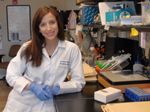by Mary Helen Yarborough
Public Relations
The path to academic achievement took a fateful turn for Loretta Hoover
who, at age 30, has won the ultra-competitive National Research
Service Award (NRSA) and now is among part of a nationally select group
of promising medical scientists.
 Loretta
Hoover, in her lab at the Darby Children's Research Institute, works
with Dr. Steven Kubalak to unravel the mysteries of heart defects. Loretta
Hoover, in her lab at the Darby Children's Research Institute, works
with Dr. Steven Kubalak to unravel the mysteries of heart defects.
Raised in the American heartland, Hoover headed to Charleston to study
marine biology at the Grice Institute after a year of study at
Rockhurst University in her hometown, Kansas City, Mo. “I had learned
that the College of Charleston had an excellent marine program at the
Grice Lab,” recalled Hoover.
While interning at the College of Charleston, she was introduced to
MUSC and some of its students with whom she did collaborative research.
From there, she became a research technician in a lab at the Hollings
Cancer Institute where she was introduced to MD/PhD program students
and researchers.
Hoover enrolled in the MD/PhD program in 2003, and her remaining two
years of the grueling doctoral program will be covered by the coveted
NRSA grant she recently won through the National Institutes of Health.
Her grant will pay her annual stipend; and underwrite the balance of
her education, research and travel for relative meetings at a tune of
about $100,000.
As part of her application for the NRSA grant, Hoover had to propose a
research study. Her research, under the mentorship of Steven Kubalak,
Ph.D., may prove groundbreaking in uncovering the mysteries underlying
congenital heart defects and certain forms of cancer.
Her proposed study deals with vitamin A signaling (the way it
communicates with a cell by telling it to divide or differentiate or
die) in embryonic heart development.
“We found that there’s a molecular signaling pathway that interacts
with vitamin A in a way that was not known previously,” Hoover
explained.
Her study, “Interactions between [transforming-growth factor-beta]
TGF-B and retinoid signaling in cardiac development,” has
serendipitously re-opened a book closed by the Carotene and Retinol
Efficacy Trial (CARET) and Alpha Tocopherol and Beta Carotene trials;
large studies that revealed that dietary vitamin A can raise the risk
for lung cancer and cardiovascular-associated deaths in smokers.
The molecular mechanism for why these trials failed is still unknown, but Hoover and Kubalak may soon uncover the answers.
“We know that vitamin A signaling is important in developmental
biology,” she said “We also know that vitamin A is important in cancer.
In our study, we are discovering that vitamin A works similarly in
embryonic heart development and cancer development. …Aberrant vitamin A
blunts other signaling pathways such as TGF-B; in other words, it
knocks them out. This causes heart defects and can make normal cells
become more like cancer cells.”
Next, Hoover wants to pursue a residency in pathology, because, “seeing
disease everyday validates our efforts and pathology is a field that
leaves lots of room for research.”
Hoover’s primary goal is to continue to make discoveries to aid those
whose task is day-to-day care of patients; and become an active part of
translational science that translates discoveries in the lab to real
cures at the bedside.
Pre-doctoral trainees receive top NIH training awards
For
the fifth year, MUSC pre-doctoral students have hit an academic grand
slam by winning the most competitive grants awarded by the National
Institutes of Health (NIH).
The National Research Service Awards (NRSA), which are the coveted
grants that promising pre-doctoral students seek to win from NIH, were
awarded to 12 of MUSC’s Medical Scientist Training Program (MSTP)
students. Three candidates are awaiting word from NIH on whether they
also have won
NRSA grants.
Winning an NRSA fellowship not only helps underwrite a portion of one’s
pre-doctoral education and training, but also signifies a very high
potential for a successful scientific career, said Perry Halushka,
M.D., Ph.D., dean of the College of Graduate Studies and director of
MSTP. The students also receive a $1,500 bonus for each year that they
have the award, which may be up to five years.
“These awards demonstrate that we have outstanding students and mentors
who are nationally competitive,” Halushka said. “In fact, our students’
success rate in winning these awards is better than twice the national
average success rate.”
Applying for the award includes three components that students must
submit; a research grant proposal, a training plan, and three letters
of recommendation. A panel of experts from various NIH institutes
reviews the applications.
At MUSC, the incentive to compete for the fellowships is not only
monetary. “We require all of our MD/PhD students to compete for the
NRSA, and we strongly encourage the graduate students to compete for
the grants,” Halushka said. “We prepare them for the process. All
students take a grant-writing course at the end of their first year of
graduate school.
“For the past 10 years, to my knowledge, only one student has failed to
succeed in getting an NRSA,” Halushka added. “Our success rate during
the last several years has been 75 percent, whereas nationally, the
success rate is 30 percent.”
The current NRSA awardees are: Timothy Whitfield (Ph.D. student);
Mildred Embree, Gabrielle Cannick (both from the Dental Medicine
Scientist Training Program); and from the Medical Scientists Training
Program: Amena Smith, Loretta Hoover (also an MUSC Women’s Scholar),
Thomas Mullen, Armina Wiggins, Andre Eaddy, Juan Varela, Mark Hallman,
Chris Gault and Joseph Palatinus.
MUSC currently has 59 MSTP students enrolled. During the past five
years, 14 students have received their own individual NRSA grants,
according to Halushka.
“Considering the size of our graduate school, this is a considerable
accomplishment and we can be very proud of our students and faculty,”
he said.
Friday, Jan. 23, 2009
|



